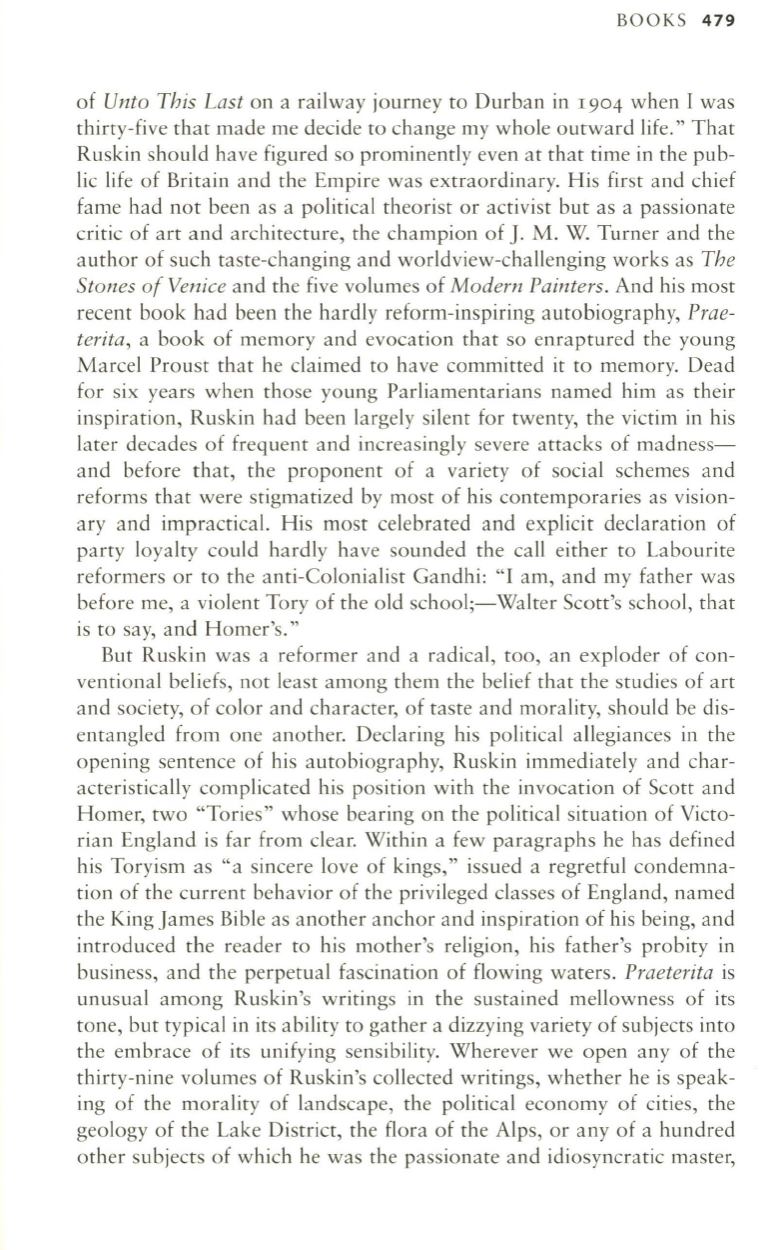
BOOKS
479
of
Unto This Last
on a railway journey to Durban in 1904 when I was
thirty-five that made me decide to change my whole outward life." That
Ruskin should have figured so prominently even at that time in the pub–
lic life of Britain and the Empire was extraordinary. His first and chief
fame had not been as a political theorist or activist but as a passionate
critic of art and architecture, the champion of
J.
M. W. Turner and the
author of such taste-changing and worldview-challenging works as
The
Stones of Venice
and the five volumes of
Modern Painters.
And his most
recent book had been the hardly reform-inspiring autobiography,
Prae–
terita,
a book of memory and evocation that so enraptured the young
Marcel Proust that he claimed to have committed it to memory. Dead
for six years when those young Parliamentarians named him as their
inspiration, Ruskin had been largely silent for twenty, the victim in his
later decades of frequent and increasingly severe attacks of madness–
and before that, the proponent of a variety of social schemes and
reforms that were stigmatized by most of his contemporaries as vision–
ary and impractical. His most celebrated and explicit declaration of
party loyalty could hardly have sounded the call either to Labourite
reformers or to the anti-Colonialist Gandhi: "I am, and my father was
before me, a violent Tory of the old school;-Walter Scott's school, that
is to say, and Homer's."
But Ruskin was a reformer and a radical, too, an exploder of con–
ventional beliefs, not least among them the belief that the studies of art
and society, of color and character, of taste and morality, should be dis–
entangled from one another. Declaring his political allegiances in the
opening sentence of his autobiography, Ruskin immediately and char–
acteristically complicated his position with the invocation of Scott and
Homer, two "Tories" whose bearing on the political situation of Victo–
rian England is far from clear. Within a few paragraphs he has defined
his Toryism as "a sincere love of kings," issued a regretful condemna–
tion of the current behavior of the privileged classes of England, named
the King James Bible as another anchor and inspiration of his being, and
introduced the reader to his mother's religion, his father's probity in
business, and the perpetual fascination of flowing waters.
Praeterita
is
unusual among Ruskin's writings in the sustained mellowness of its
tone, but typical in its ability to gather a dizzying variety of subjects into
the embrace of its unifying sensibility. Wherever we open any of the
thirty-nine volumes of Ruskin's collected writings, whether he is speak–
ing of the morality of landscape, the political economy of cities, the
geology of the Lake District, the flora of the Alps, or any of a hundred
other subjects of which he was the passionate and idiosyncratic master,


